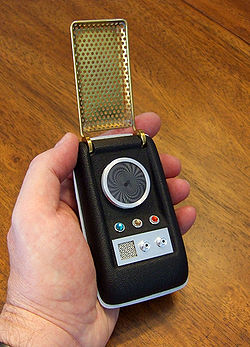General Discussion
Related: Editorials & Other Articles, Issue Forums, Alliance Forums, Region ForumsIn the future, do you think that astronauts will be using mobile phones in space?
Right now we have PayPal providing services for cosmic banking. From this, I think that mobile telco companies (like Vodafone) will one day provide their services directly into space. So, do you think that it is possible?
In_The_Wind
(72,300 posts)[URL= .html][IMG]
.html][IMG] [/IMG][/URL] to DU.
[/IMG][/URL] to DU. ![]()

kentauros
(29,414 posts)communications system, but it won't be "cell" based. It will have to be satellite-based. At first, everything will probably go through a government system. Whenever the private companies establish themselves up there, then we might see private systems installed, but only if they can get people to use it. If they continue to use the government system, they won't be able to compete.
What will likely happen, is that the government will give exclusivity to various companies to set up and operate the system. Most people in space will continue to be government astronauts for a long while due to governments being better able to afford such costs, and justify them, without the burden of stockholders.
I had a same thought and agreed with you that the system will be satelite based.
What I want is the convenient access of the conventional cell phones into satelite services, but I think that it will be only used on ISS or the moon (with not so good quality) in the present time, since signal travels at only a light speed.
I'm sure that if FTL communications are made possible, my idea will more likely to come true and generalized.
kentauros
(29,414 posts)explored that very subject in 2001: A Space Odyssey. Dr. Heywood Floyd talks to his daughter on Earth, and not only is there a noticeable delay, but the call is handled by Bell Telephone. Even the charge for the call is shown at the end ![]()
Now, they likely never considered that Ma Bell would ever be broken up, but they did at least figure that a private company would handle "civilian" calls, while everything else they used seemed to be government or military based.
In most everything else in science fiction, civilian calls seem to be handled by government systems. While Babylon 5 still has a healthy corporate community present, the calls people make, even for civilians, all seem to go through a government-run system. Maybe that's because it's a government-run space-station, but JMS didn't make a corporate-run communications system for his series. I have no idea how civilians talked to one another in Star Trek as that's never addressed.
The use of FTL-communications will at first be determined by who makes that discovery. If the government, then expect the military to use it heavily at first. Later, the government will license access, as they supposedly do with the airwaves terrestrially.
I'm not convinced that if a corporation develops it first, that they will make it available to all for an exceptionally long time, if ever. They'd keep that technology under wraps and only allow top executives the privilege of its use. Allowing the technology to be released would mean they couldn't monopolize it.
Javaman
(62,530 posts)B Calm
(28,762 posts)Sarcasm directed at the airlines!
backscatter712
(26,355 posts)Today on the ISS, they have purpose-built communications systems, including several communications satellites that were originally launched for Space Shuttle communications. So now they have voice, video and data links, which allow the people onboard to talk with the ground, put phone calls through when they need, and yes, surf the web & such.
Recursion
(56,582 posts)Cell transmissions are microwaves, which are a form of radiation, and when you're outside of the ionosphere there's a very big competing source of radiation that would tend to scramble stuff.